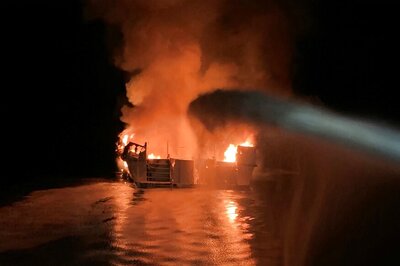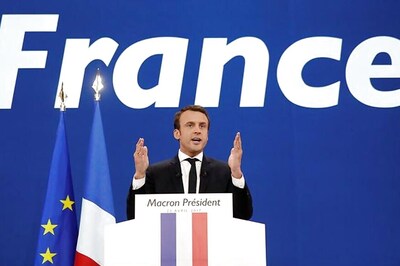
views
Chandigarh: Border Security Force Director General K K Sharma on Sunday said that the force has been giving a befitting reply to unprovoked firing incidents on the International Border (IB) in Jammu and Kashmir by Pakistan.
He also stated that the BSF planned to plug gaps along the country's borders with Pakistan and Bangladesh by rolling out a Comprehensive Integrated Border Management System (CIBMS).
The BSF DG was interacting with the media here after laying the foundation stone of Administration Block of headquarters, Special DG, Western Command, Chandigarh.
Senior BSF officers, including K N Chaubey, Mukul Goel and H S Dhillon, were among others present on the occasion.
"BSF plays a very important role in guarding two very important borders of Pakistan and Bangladesh. We have different kinds of challenges on both the borders whereas on the Pakistan side, we know that we have a hostile neighbour. We know they keep on trying to infiltrate militants," the BSF DG said.
"They keep on indulging in ceasefire violations from time to time. They also snipe at our men. Despite of all these operational challenges, the BSF has given them a befitting reply..," he said.
Sharma said he cannot say how and when the activity of unprovoked firings and ceasefire violations (from across the border) in J&K sector along the IB will stop, "but the force always remains prepared to face any eventuality".
"We have had a free hand always and we have given a befitting reply on all the occasions. On each occasion, we have inflicted more casualties on the other side of Pakistani Rangers...I would like to make one thing clear that we never initiate ceasefire violations and it is the other side which starts as a result of which we have to retaliate and react."
"We must realise that we are dealing with a very hostile neighbour in Pakistan. It is their state policy to ensure that militants sneak in, it is their policy to keep these two Kashmir and Jammu borders alive so that internationally they would like to score the points...," he said.
Sharma shared the BSF's plans to roll out the CIBMS when asked about the strategy of the force to plug the gaps in porous borders with 'nullahs' and rivers in between.
The CIBMS is an integration of a number of new gadgets and technologies to ensure electronic surveillance of borders. These provide feeds to the BSF personnel at the border outposts, where monitors would be installed.
"We are in the process of infusing more and more technology so far as border guarding is concerned," he said.
The BSG DG said two pilot projects in two 6-km patches each along the India-Pakistan border in Jammu frontier, where all the latest gadgets and technologies are being deployed, will be inaugurated this month by the Union Home minister.
"We have identified roughly 2,400 km on both borders — Pakistan and Bangladesh — where CIBMS will be rolled out (in future). Then ultimately, all the gaps will be covered by an appropriate technology. For the time being, all these gaps are covered by using infra red devices and other equipment. Even today, these gaps are not unattended, they are plugged and they are properly covered, but after CIBMS they will become more secure," he said.
With Punjab sharing 553-km International Border with Pakistan, the BSF also faces the challenges to man the border, which it considers as "vulnerable".
Asked about the key challenges in the Punjab frontier, particularly with regards to tackling inflow of narcotics from across the border is concerned, Sharma said, "Punjab is a very sensitive border so far as smuggling of narcotics is concerned. Keeping that thing in mind, we strengthened the deployment and in 2016..."
"We have an excellent working relationship, coordination with sister agencies like NCB and local police," he added.
Apart from guarding the Pakistan and Bangladesh border, the BSF DG said the force is also deployed in left-wing extremism areas in the two states.
On being asked about the ongoing Pahalgam Yatra, he said, for protecting the Pahalgam route, the BSF has been deployed for many years.
Asked about the strategy the BSF adopts in dealing with incidents of stone-pelting in the Valley, he said, "This is an occupational hazard, we generally ignore and move ahead, there are a few broken glasses here and there..."
Sharma, meanwhile, informed the BSF actively runs several initiatives for border residents and interacts with civil population.
"Several activity bring us close to the population, they are our second line of defence, they are our eyes and ears," he added.



















Comments
0 comment